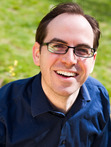Adam Szymkowicz's Blog, page 82
February 23, 2013
I Interview Playwrights Part 552: Jonathan Rand
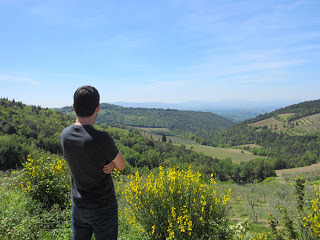
Jonathan Rand
Hometown: Jacksonville, FL
Current Town: Santa Monica, CA
Q: What are you working on now?
A: An evening of short comedies
Q: Tell me about Playscripts. How did it come about?
A: Fifteen years ago my brother Doug and I were two playwrights baffled by the lack of innovation in the play publishing and licensing industry. We founded Playscripts to fill that need and provide playwrights an opportunity to have their work read and produced as much as humanly possible. What started with eight plays in a dorm room has now become a fully-staffed Manhattan enterprise that represents over 1,800 plays by over 900 playwrights, and was ranked by Inc. Magazine as one of the nation’s fastest growing companies. It's been an exciting time.
Q: Tell me, if you will, a story from your childhood that explains who you are as a writer or as a person.
A: In the sixth grade I wrote and directed a play in English class called A Nightmare on Sesame Street, in which Big Bird and the gang turn to a life of crime. Huge Pulitzer snub.
Q: If you could change one thing about theater, what would it be?
A: I'd like to say something profound, but my knee-jerk answer is to have a machine that automatically powers down all audience members' cell phones. I'd like to see this for movie theaters, too. And at funerals.
Q: Who are or were your theatrical heroes?
A: My grandfather Jerome Sorkin was a master carpenter who made a career building Broadway sets and working as a stagehand. I'd like to think he's the genetic force behind my entire family's theatre obsession.
Q: What kind of theater excites you?
A: The kind where I forget I'm in a theater.
Q: What advice do you have for playwrights just starting out?
A: You'll hear that it's healthy to write as much as possible, to write first and edit later, and so forth -- and that's all great advice. But in order to even get started, you need to sit down and do it. And that means powering down email, Twitter, your iPhone -- everything. If you have to lock all your devices in a safe, do it. Once you've truly eliminated all distractions, you'll have no excuse but to focus on nothing but the page in front of you.
Q: Plugs, please:
A: jonathanrand.com, playscripts.com
---
Book Store
Books by Adam








Published on February 23, 2013 07:28
February 14, 2013
I Interview Playwrights Part 551: D.L. Siegel
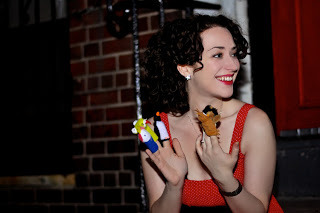
D.L. Siegel
Hometown: Staten Island, NY
Current Town: Astoria, NY
Q: Tell me about Chosen.
A: Chosen is a one-act play about cultural pride, racism, family, and love. It is without a doubt the most personal play I've ever written. But it's a comedy! Because I think the most painful stories in our own lives should always be funny to other people.
Q: What else are you working on now?
A: I'm in the research stage for a few big projects right now, which is a fun and terrifying place to be. One play is a collaboration with Melissa Crespo (the director of Chosen and my spiritual other half). Melissa and I are working on a devised piece together that's going to be really politically charged and personal for both of us. Or at least that's the hope.
And then I'm also moving towards the early workshop stage for a new full-length play commissioned by IVP, a really fantastic group of female performers, co-founded by my childhood friend, Ashley Adelman.
Honestly, I feel very lucky to be so busy right now.
Q: Tell me, if you will, a story from your childhood that explains who you are as a writer or as a person.
A: When I was around 9 years old, my parents, my older brother and I all went to see Miss Saigon on Broadway. I don't remember feeling very affected by all the sexy stuff happening on stage -- I just thought all the dancing and noise was exciting. Besides...we had really great seats and it was my 2nd Broadway show ever; so they could have been sacrificing a live goat up there and I would’ve been enthralled. Anyway. When the lights came up during intermission, my mom took a deep breath, turned to me and blurted out ‘honey, do you know what a prostitute is?’ I honestly don’t remember my exact response. But I figure it was the kind of rushed affirmative response that attempts to steer clear of having ‘the talk’ in the middle of Miss Saigon. I think that’s still how I look at theater…the ideas I love to see portrayed on the stage, the taboos I most love to see broken and opened and re-purposed, those are the topics I am least likely to willingly discuss with my mother.
Q: If you could change one thing about theater, what would it be?
A: The emphasis on first-runs is a killer. When and why did the branding of a ‘world premiere’ become so important? Given how many Broadway and Off-Broadway shows are revivals, it seems ridiculous to me that new work at the ground level often gets only one shot to it get it right. Bonkers.
Q: Who are or were your theatrical heroes?
A: I love the Greeks, especially Sophocles and Euripides. So I’m a sucker for writers and directors who don’t just re-translate these classics but adapt them in new, crazy, remarkable ways. Like Ed Sylvanus Iskandar with his food and his gorgeous stage pictures and his generally jaw-dropping direction of 'These Seven Sicknesses.' And Charles Mee, who would be one of the guests at my dream dinner party.
Also, Sarah Ruhl, Erik Ehn. Shakespeare. Tony Kushner. August Strindberg. Laura Maria Censabella, who made me braver than I thought possible.
Q: What kind of theater excites you?
A: I want the passion, the risk. I don’t want to see a slice of life, I want a peek at the characters’ most lurid secrets and dreams. I crave magic, and not just in the stagecraft. Get the actors out of their chairs, away from their tables, and give them some choreography or some puppets or some confetti to throw around. I like to leave the theater feeling like I just saw an almost supernatural event in front of me. Plays where the actors sink into the upholstery for two hours do not generally interest me.
Q: What advice do you have for playwrights just starting out?
A: Don’t expect all the people in your life -- even the really important ones -- to fully understand what you do or appreciate how hard it is. Because most of them just won't. They can't, and they'll frequently doubt your sanity. So get a therapist and a gym membership and do what you can to surround yourself with people who make you laugh. And don't let anyone tell you that romantic relationships distract you from your work. Because true love inspires. Also, unrelated to that last point, take naps. Lots of naps. Writing's exhausting.
Q: Plugs, please:
A: Chosen @ HERE Arts Center, presented by the Downtown Urban Theater Festival. Wed. March 13th at 8:30pm. For more info and tickets: http://www.here.org/shows/detail/1148/
My website, hot off the presses: www.dlsiegel.com
IVP, a great group of gals making theater together. http://infinitevarietyproductions.com/
Corey Pajka, my boyfriend, is also a playwright, and he's got a play coming up in the Midwinter Madness Short Play Festival next week. http://www.smarttix.com/show.aspx?showcode=OLD10 Oh, and one more plug! The New Voices Festival is about to start up at the New School for Drama. The MFA Playwriting thesis plays are serious business, go if you can.
---
Book Store
Books by Adam








Published on February 14, 2013 06:09
February 6, 2013
I Interview Playwrights Part 550: Donnetta Grays
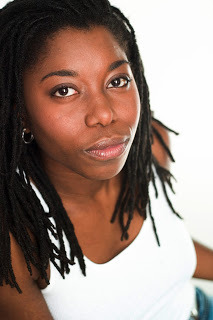
Donnetta Grays
Hometown: Columbia, South Carolina
Current Town: Brooklyn, NY
Q: What are you working on now?
A: I am working on two plays of my own ‘The Review or How to Eat Your Opposition’ which is currently being developed as part of terraNova Collective’s Groundbreakers Playwrights Group and ‘Sam’ a play about an 11-year old girl (Sam) who is unexpectedly transplanted from her home in Georgia to NYC. It’s a coming of age story with several emotional stumbling blocks for this kid placed there by her very young and ill-equipped parents. I am also collaborating with some tremendously talented friends on a few of their own personal projects. I won’t go into detail but the work they are doing is gorgeous and I can’t wait for people to hear what’s being created in living rooms all over the city!
Q: Tell me, if you will, a story from your childhood that explains who you are as a writer or as a person.
A: I was an extremely shy kid. Hardly spoke. Got picked on a good bit in middle school. In fact I call middle school “three years of my life I can’t get back.” Anyway my mother - always ready for a good story - would, everyday after school, ask her three kids about our day. Both my sisters were extremely articulate and damn near loquacious going into elaborate details about who did what to whom, at what time AND what they were wearing. I, on the other hand, would shrug and usually answer, “It was okay.” My mom would see through this though. She read my frown and furrowed brow and could tell something else was going on with me. So, one day she did this sort of miraculous thing where she wrote me a letter and left it on my bed for me to find. It read something like, “I know you are sad. I don't know why you are sad but I think it might be hard for you to talk about. I want you to know that I am here if you ever do feel like talking about it. And, you know, sometimes it’s easier to write your feelings down than to say them out loud. ” Etcetera etcetera tears tears tears... ANYway, it was this truly wonderful thing that I totally took advantage of and she and I started writing these little letters to each other where I would open up about all this kid angst and she would advise and console me. It was our little secret exchange and it cracked my heart wide open. And so, I guess I am still putting some form of kid angst on paper and trying to express those very complicated emotions that most of us would rather hold on to in private.
Q: If you could change one thing about theater, what would it be?
A: If a theater artist can’t afford to see a show then the ticket is too damn high.
Q: Who are or were your theatrical heroes?
A: Allison McNeely and Joy Vandervort-Cobb. My high school drama teacher and college mentor respectively. Allison taught me what theater was, how to love it and how to create it. Joy made me believe that I could actually do this for a living and nurtured that hunger in me from the moment we met. They were and still are gorgeous actors, directors and teachers. And I am not sure if they know this, but for as much as they taught me about my craft I spent just as much time watching them lead. Turning students into actors and crumpled scripts into productions. They knew how to take command in this way that elevated the work of those around them so I always has this sense that theater wasn't something that was created while I just sat back and watched. It was something that I could actually take the lead in creating.
Q: What kind of theater excites you?
A: A variety of things. Really it’s too much of a variety to go into but I will say if there is a foul-mouthed sexually confident but emotionally delicate woman of color involved I’ll probably be there watching that.
Q: What advice do you have for playwrights just starting out?
A: Please, I am still in the asking for advice stage. No comment...yet.
Q: Plugs, please:
A: 'The Review or How to Eat Your Opposition' will have a workshop presentation this spring along with plays by Lynn Rosen, Andrew Rosendorf, Jen Silverman, Susan Soon He Stanton & Anna Ziegler in terraNova Collective's Groundworks New Play Series. Check the website for details: www.terranovacollective.org/
---
Book Store
Books by Adam








Published on February 06, 2013 09:41
February 5, 2013
Video: Interview with Nastaran Ahmadi
http://youtu.be/6aKiOW1d8ek
--
Interview with Nastaran Ahmadi about playwriting, her lesbian theater company, and her upcoming show at the Cherry Lane. http://www.cherrylanetheatre.org/prog...
Previous playwright interview with Nastaran: http://aszym.blogspot.com/2012/06/i-interview-playwrights-part-462.html
Nastaran Ahmadi's plays include Molly's 25th (art.party.theater.company, 2012), Exile (Finalist, 2012 O'Neill Fest; Honorable Mention 2012 Jane Chambers Award), The Bet (Workshop in Oregon Shakespeare Festival's 2012 Black Swan Lab), Doctoring (Finalist, 2010 O'Neill Fest; Honorable Mention 2010 Jane Chambers Award), The War Is Over (Yale Cabaret, 2006), Strangers (The Ontological-Hysteric Theater 2009 "Incubator" Series), and Layla and Majnun (Carlotta Festival, 2006). Nastaran attended The Exchange's Orchard Project in June 2012 to develop her new play with original music, Rocket Song. Nastaran was a 2011-2012 Writing Fellow at The Playwrights Realm in NYC and a 2011-2012 Writer-in-Residence in Lower Manhattan Cultural Council's Workspace program. She received an Honorable Mention in 2010 for the Middle East America Distinguished Playwright Award. Nastaran is delighted to have been invited to serve on The Lark Play Development Center's Artistic Advisory Board for the 2012-2013 Season. Member Playwright: Lark Play Development Center (Monthly Meeting of the Minds, 2012/13). MFA: Yale School of Drama, Playwriting (ASCAP Cole Porter Prize). www.nastaranahmadi.com
---
Book Store
Books by Adam








Published on February 05, 2013 09:15
February 4, 2013
listen to me talk for an hour
A podcast I did today at Off and On, A New York Theater podcast with Bernardo Cubria http://andscenepod.libsyn.com/rss
--
Book Store
Books by Adam








--
Book Store
Books by Adam








Published on February 04, 2013 15:50
I Interview Playwrights Part 549: Anupama Chandrasekhar
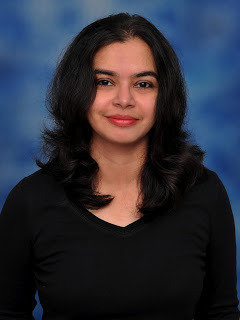
Anupama Chandrasekhar
Hometown: Chennai, India
Current Town: Chennai, India
Q: Tell me about Disconnect.
A: It’s about a bunch of young call center workers who work nights, sleep days, put on different personas and accents in order to collect debts of credit card holders in recessionary America. It’s about identity in a new India, globalization and our interconnected lives and economies. It’s about Indians in India who have stars and stripes in their eyes.
Q: What else are you working on now?
A: A new play called “Bay-Sea-Ocean”. Set in the southern-most tip of the country, where a bay, a sea and an ocean meet, it deals with the abandonment of the elderly. The question I’m trying to ask is this: What happens when a culture that has historically elevated the status of parents to higher than that of god is fast-tracked into a consumerist economy and the old family system crumbles? Whose responsibility is the care of the elderly then?
Q: What is the theater scene in India like?
A: Our early theater was primarily dance, music and mythological drama that successfully segued into the cinema in the last century. When cinema picked up, theater started to lose its luster. By the ‘90s, theater – especially urban theater - was struggling to be relevant.
Now, in Chennai, English language theater is mostly amateur. We don’t have state funding for it. Like small, fringe groups across the world, we have to scout for sponsors (who more often than not prefer comedies to issue-based plays). We rehearse on someone’s terrace weeknights or weekends depending on how lenient the actors’ employers are. We hire a theater for two days - if we have the money -- or for a day. The first day is tech, dress, preview and opening. Sometimes, the press covers the shows. In two days, the show is over. If we are lucky and have made some money, we can travel to another city with the show.
We Chennai-ites are envious of Mumbai and its theatrical spaces. A subsidized theater like Prithvi Theater in Mumbai ensures that small groups can put up their plays at regular intervals at a small cost. But if you ask a citizen of Mumbai, they’d look towards Marathi language theater (particularly of Pune) for their role model. Marathi theater is possibly the most vibrant and alive of all Indian regional theaters. They’ve a culture of grooming new writers and directors from the college level and there’s a large and supportive audience for it.
But things are definitely changing across the nation. There is a growing number of youngsters who are trying to make theater their full-time profession and who are trying to bring immediacy and relevance back to theater.
Q: What has it been like having your plays done in London and America?
A: I love it that my plays have life beyond the two shows that’s possible in Chennai. Entire runs, revivals, remounts – these are stuff that I’d never even dreamed of. Also, I come from a country where there’s no formal training available to playwrights. So, working professionally with cutting-edge theater practitioners has been a cherished, valuable masterclass in theater-making.
Q: Tell me, if you will, a story from your childhood that explains who you are as a writer or as a person.
A: I grew up with my grandparents in Chennai (because I could not get admitted into a school in Mumbai where my father was working). Now, my great-grandparents lived with my grandparents. Whenever the various aunts, great aunts and cousins would visit us, it was a raucous little house filled with family stories. I was fascinated by these women and their gossip. At night, the living room would be cleared to accommodate many mats and mattresses and pillows and all the women would sleep there. I’d pretend to be asleep while avidly listening to them. These nights were amateur psychology sessions: why did Person A say that? Why did Person B do that? I’d learnt to keep my mouth shut about it and for years no one knew I was happily eavesdropping.
My mother discovered it by accident when I knew something about someone I oughtn’t to. She was naturally appalled that my grands were allowing this sort of behavior in a young person. But the damage was done. I was hooked to other people’s stories.
Q: If you could change one thing about theater, what would it be?
A: At least in the Indian context, I wish there is funding for serious theater that deals with regional or national concerns and more awards and opportunities for playwrights.
Q: Who are or were your theatrical heroes?
A: Indian playwright Mahesh Dattani – for first introducing me to theater and making me pay attention to the rhythms of Indian English.
British playwright Carl Miller and Royal Court Theater’s Elyse Dodgson and dramaturge Ruth Little for opening my mind to new forms and influences.
Indhu Rubasingham, now Artistic Director of Tricycle, who directed my plays “Free Outgoing” and “Disconnect” for the Royal Court – for making me look inward and tap the voice that was small, but all mine.
Playwright Caryl Churchil is forever experimenting with form and content. She is a writer who is eternally young and exciting.
Q: What kind of theater excites you?
A: Plays with social relevance, physical theater, children’s theater, plays that surprise me, plays that make me think for days together, plays that take me by the scruff of my neck and shake me up.
Q: What advice do you have for playwrights just starting out?
A: Read, watch, write, rewrite. There is no other way. And keep at it.
Q: Plugs, please:
A: Disconnect at Victory Gardens directed by Ann Filmer from Jan 25th to Feb 24th
Disconnect at San Jose Rep directed by Rick Lombardo from March 21st to April 14th
---
Book Store
Books by Adam








Published on February 04, 2013 07:38
January 25, 2013
I Interview Playwrights Part 548: Matt Pelfrey
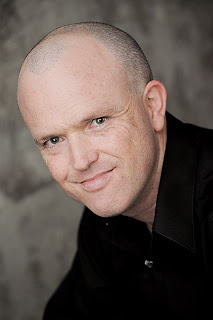
Matt Pelfrey
Hometown: Los Osos, California.
Current Town: Pasadena, California.
Q: Tell me about The Pilo Family Circus now playing at the New Ohio. How did you come to adapt it and what was the process like?
A: I read the Pilo Family Circus novel and immediately thought of Joe and Godlight. The novel was such an imaginative blast and everything I like in stories: scary, funny, and full of unexpected twists and turns. While the novel has some big moments that had to be re-imagined to work as a play, we've kept the heart and soul of the book intact.
Q: What else are you working on?
A: Next up with Joe and Godlight is an adaption of DELIVERANCE.
Q: Tell me, if you will, a story from your childhood that explains who you are as a writer or as a person.
A: When I was young, I was at my grandmother's house which was on a big plot of land. My dad wanted me to go up the hill to the front gate and get the newspaper. I told him I didn't want to because I was afraid of snakes. He yelled at me and made me go anyway. At the top of the hill, coiled up, was a rattle snake. I ran back down the hill screaming about what I'd just seen. Nobody believed me. I finally made a big enough deal that my dad, pissed, stormed up the hill. Thank god the rattle snake was still there. Weird shit happens.
Q: If you could change one thing about theater, what would it be?
A: More funding for small theaters that do visceral work.
Q: Who are or were your theatrical heroes?
A: Besides Joe Tantalo? Eric Bogosian.
Q: What kind of theater excites you?
A: The kind that makes me think: "there's no way they'll go there." Then they do.
Q: What advice do you have for playwrights just starting out?
A: Write five rough pages every day, and read as much as you can. The rest will work itself out one way or the other.
---
Book Store
Books by Adam








Published on January 25, 2013 08:35
January 22, 2013
I Interview Playwrights Part 547: Caroline V. McGraw
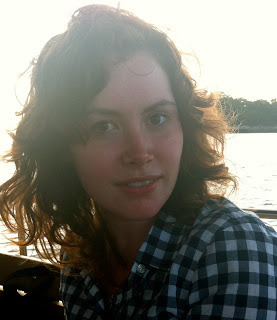
Caroline V. McGraw
Hometown: Cleveland, Ohio
Current Town: Brooklyn, NY
Q: Congrats on being the new P73 Fellow. What do you plan to work on with them in your fellowship year?
A: Thanks very much! I'm working on two plays with the support of Page 73. One is currently untitled; it's about a group of writers at a women's magazine, one of whom has just learned she only has a few months left to live. It's about how the things that are supposed to be important in a bright young women's life--sex, good looks, romance, wit, small adventures--can melt when you shine a bright light on them.
The other play is called Believeland, and it's a big melting pot about my complicated relationship with my hometown. The play is organized, if you can say that right now, around the poetry of d.a. levy, an artist who wrote about Cleveland from a place of deep love and brutal honesty. I can only hope to do the same.
Q: Tell me, if you will, a story from your childhood that explains who you are as a writer or as a person.
A: The summer between fifth and sixth grade, I decided I wanted to start reading Stephen King, so I picked up IT at the library before my family's annual trip to our cabin in upstate New York. I figured it was a good one to start with, since the jacket said it was about 11-year-olds. I plowed through the book, reading it at night when my parents were out canoeing and I was all alone in a creaky old dark house. And at the same time, I wasn't quite done being a little girl...my mother and I were still reading aloud to each other most nights, we would have been deep into the L.M. Montgomery oeuvre. I started living in a world where being a girl who thought her stuffed animals had feelings and wanted to be Emily of New Moon could exist alongside this growing knowledge of some of the darker, grimier, ookier, scarier stuff that life has to offer.
Q: If you could change one thing about theater, what would it be?
A: Can I change two? I'm gonna go ahead and change two. First, more women writers produced in the "big" spaces--Broadway, the big deal subscriber off-Broadway houses, big regional theaters. I want it to not be news that a woman has a play on Broadway, or that a theater's season is half (or more!) written by women.
I also want theater to be part of the, for want of a better term, pop culture conversation. Suzan Eraslan wrote this open letter to the New York culture press that is well worth a read (http://suzaneraslan.tumblr.com/post/38323214719/an-open-letter-nyc-culture-press-what-are-we-doing), and it articulates beautifully what I've been feeling for awhile. There is so much gorgeous, weird, fucked up theater happening at all hours of any day, and it isn't a part of my generation's lives and consciousness the way music, film, and comedy are. I think it's a change that's going to have to happen in an evangelical way; theater makers have to keep making noise about our work and what we have to offer audiences.
Q: Who are or were your theatrical heroes?
A: Paula Vogel, Ken Prestininzi, Deb Margolin, and Frank Pugliese are writers I've been lucky enough to have as teachers and mentors, who I am constantly checking in with, either on the page or inbox. My first playwriting teacher was a wonderful writer named Sarah Morton, she taught Saturday playwriting classes for high school students at the Cleveland Playhouse and she made me want to be a playwright. Young Playwrights Inc. produced my first play ten years ago, thus effectively ruining me for all other professions, and the way Sheri Goldhirsch and the rest of the staff nurture young writers is extraordinary and necessary.
Q: What advice do you have for playwrights just starting out?
A: Live in a city where there's a lot of theater, and go see as much as you possibly can of as many different types as you can. Musicals, downtown, big, small, solo, classics, college productions, readings. It's expensive, especially in New York, but it's the best education you can get. The more plays you get in front of your eyes and in your ears, the more you start to realize what your obsessions are. You realize the places that feel like home, and they may be surprising. You want to warm up the space that's left cold by an unsatisfying evening of theater, or you want to start a conversation with a writer who seems to understand you from miles or years away.
Q: What kind of theater excites you?
A: As you'll see from my previous answer, I have pretty broad theatrical tastes, I'll see anything and everything if I think it will delight me. I think what I'm responding to right now is theater where I feel taken care of. Not comfortable, necessarily, but where I feel like I'm experiencing something that has been made by a group of collaborators in order to have a conversation with the audience. Sam Hunter's The Whale and the recent Art Party show How the Salts Got Down, directed by Mary Birnbaum, both shook me in big ways. They could not be more different, but they were both shows that made new worlds for the audience, with a love of connection and theatricality that I found incredibly satisfying. Oh, and the Art Party show had dancing. I like having the opportunity to dance and sing along with pop music.
Q: Plugs, please:
A: A reading of my play The Bachelors is happening February 11th at NJ Rep. I'll be performing/making people think differently about Katy Perry at the New Georges Trunk Show on February 22nd. And, if you're in Seattle in the Spring, you can see the premiere of my play Tall Skinny Cruel Cruel Boys at Washington Ensemble Theatre (www.washingtonensemble.org.)
---
Book Store
Books by Adam








Published on January 22, 2013 06:20
January 15, 2013
Video Interview With Devan Sipher
This is the first in what I hope will be a series. I talked a bit with my friend, Devan Sipher, playwright, journalist and novelist. http://www.devansipher.com/
http://youtu.be/B0zyZ-PnESo
---
Book Store
Books by Adam








http://youtu.be/B0zyZ-PnESo
---
Book Store
Books by Adam








Published on January 15, 2013 09:30
January 14, 2013
I Interview Playwrights Part 546: Kiran Rikhye
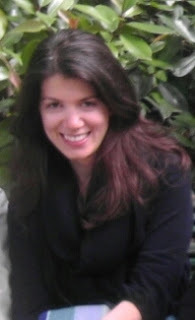
Kiran Rikhye
Hometown: I'm from New York City.
Current Town: Still here in New York!
Q: Tell me about The Man Who Laughs.
A: The Man Who Laughs is a "live silent film for the stage"--the whole show is designed to look and sound like a silent film of the 1920s, right down to black-and-white makeup, costumes, and sets, title cards projected onto a screen, and live piano accompaniment. There will even be popcorn at the show to complete the movie experience! The play is (loosely) based on the Victor Hugo novel of the same name, and tells the story of Gwynplaine, an orphan whose face has been surgically carved into a permanent smile. Gwynplaine gains fame and a modest fortune by performing as a clown/freak alongside his adoptive sister, Dea, and adoptive father, Ursus, a surly ventriloquist. They're quite a happy, quirky little family...until a debauched duchess becomes fascinated by Gwynplaine's face and seduces him away from his family, with disastrous results. There's a little melodrama, a little romance, a little slapstick comedy...a little of everything!
Q: What else are you working on now?
A: I'm very excited to be working on Stolen Chair's upcoming (currently untitled) show which will debut in the spring at the Cibar martini lounge on Irving Place in Manhattan. It's in the very early stages of development, and I'd be hard-pressed to tell you what the heck it's about or who the characters are...but that's part of what's exciting about it. I've been given the task of writing a play for this unusual performance space, and now I get to concoct a whole plot and cast of characters specifically to fit that space. The constraints are both challenging and freeing, and I'm really looking forward to seeing what the piece ends up being...I'm thinking it'll have something to do with the art of the martini, perhaps.
Q: Tell me about Stolen Chair.
A: I founded Stolen Chair ten years ago with my Co-Artistic Director (and Stolen Chair's resident director), Jon Stancato, and we've been creating and producing original works of theatre ever since. We strive to make work that's playfully intellectual, exuberantly athletic, aesthetically promiscuous, and wickedly irreverent, and that challenges and delights audiences in inventive and constantly evolving ways. I think our company is unusual in that we have both a playwright's and director's vision at our core: sometimes we're playwright-centered, sometimes director-centered, sometimes we're a strange hybrid of both. In addition to that, each new production begins with a collaborative retreat in which actors and designers bring their own creative ideas to the table, so we get quite a potent mix of influences going in to every show. Though I'm sure our process wouldn't be everyone's cup of tea, I find it to be incredibly gratifying (and I'd like to think it yields interesting work, too!).
Q: Tell me, if you will, a story from your childhood that explains who you are as a writer or as a person.
A: Hmmm...Well, when I was about five, my parents took me to see a production of The Mikado, and I was thrilled...until Koko the Lord High Executioner came out wielding an enormous axe. I *knew* that it was just a play, and I *knew* that the axe was real, and yet there was a part of me that wondered "What if...? What if it *is* real? What if that character is going to walk through the aisles and decapitate audience members as part of the show?" I think by the middle of the first act I had convinced my father to leave our seats and stand in the back, just in case things turned ugly.
I'd say this explains a lot about me, including that:
1. I had an overactive imagination and a bit of a morbid streak.
2. I probably take theatre a little too seriously
3. I really love the way theatre can still us pull us into that peculiar "it's real but it isn't but it sort of is..."
4. I really, really hate audience participation and try to avoid it in my own work.
Q: If you could change one thing about theater, what would it be?
A: I'd love to erase the divide between traditional and "edgy"/experimental. I'd love it if telling a "traditional story" didn't automatically imply that the style was going to be naturalistic, and if using non-naturalistic techniques (mask, dance, what have you), didn't automatically imply that the play was not plot and character driven. There's actually a lot of work that crosses those lines, yet somehow, I think a lot of people still have the idea that good old fashioned stories have to be told through good old fashioned realism. I wish it would stop seeming so groundbreaking to tell good old fashioned stories through experimental means and vice versa.
Q: Who are or were your theatrical heroes?
A: Charles Ludlam and the Ridiculous Theatrical Company are biggies. Though I never saw their work live, seeing videos of the work and reading Ludlam's scripts, I'm inspired by the ways he tried to make his audience laugh and feel at the same time, and by the ways in which his work is earnest and ironic, irreverent and intelligent and silly and highfalutin all at once.
Moliere is another hero--for some of the same reasons. (I'm sure it's no coincidence that both Ludlam and Moliere were playwrights at the center of companies. I've been very inspired by the company model, by playwrights who form long-term artistic relationships with actors and directors and who are accountable to a team of mutually supportive artists.)
Then there are the individual writers whose work never ceases to delight and fascinate me, and those range from Oscar Wilde to Amy Freed to David Henry Hwang.
Q: What kind of theater excites you?
A: I've found myself truly inspired by everything ranging from kitchen-sink realism to grand opera, but, if I had to choose a single kind of theatre that excites me, I'd say it's theatre that wears its theatre-ness on its sleeve. I love that theatre actually cannot mimic reality as well as film can. So I love stage illusion that asks the audience to suspend disbelief very actively, to believe in a world that very obviously isn't real. Looking at shows that recently came to New York, I think War Horse is a good example of this. You know that horse is a puppet, but that doesn't make you care about it less. It might even make you care about it more, even though it's "fake"...
Q: What advice do you have for playwrights just starting out?
A: Everyone's path is so different that it's hard to think of one piece of advice that really applies across the board (how’s that for a copout answer?). That said...if I had one piece of advice, I think it would be to get your work up in front of an audience as often as possible, even if it's just a group of friends gathering in someone's living room to hear a reading. For one thing, having to present your work forces you to dot your i's, cross your t's, put a period at the end of the last line, and call the darn play finished. Taking your time and slowly revising are important, but having to consider a script "finished," at least temporarily, is important, too. For another thing, I think putting your work in the hands of actors and, if possible, a director, tells you so much about what you're writing. It's so important to see what happens to your work when other people bring their perspectives to it--after all, at the end of the day, you're only one part of the theatre-making process. What happens when an actor takes an approach to a character that you never could have imagined? Or when a director simply doesn't understand the natural rhythms that you thought were so obviously written in to the piece? Sometimes those encounters make you realize there are things you want to revise, other times they make you see your own work in a new light, and, yes, sometimes they just make you feel that your work is being misinterpreted. But whatever happens, I think it helps you grow. Lastly, practice makes perfect, so the more we write, the better I think we get at it, and creating opportunities for your work to be seen is a good way to keep yourself writing.
Q: Plugs, please:
A: The Man Who Laughs opens on January 31 at Urban Stages in New York! For more information or to buy tickets, visit www.stolenchair.org or call SmartTix at (212) 868-4444.
---
Book Store
Books by Adam








Published on January 14, 2013 12:09

